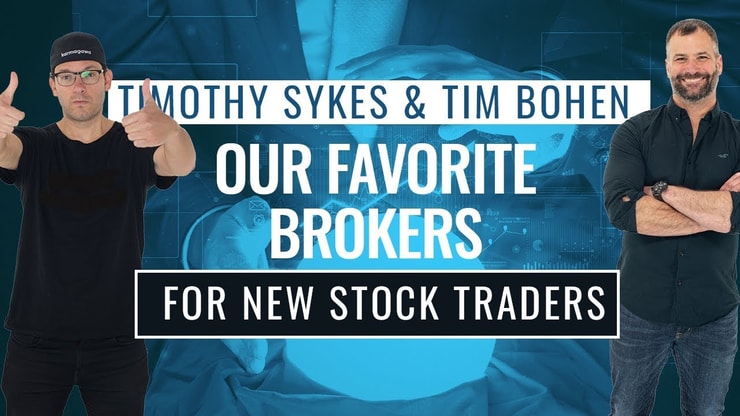Like other trading strategies, options trading needs a trading platform that fits your needs. And the needs of options traders can vary wildly.
Some options traders are basically swing traders, trading on a stock’s current movement. Charts will help them as much as any other stock trader.
Some are super technical. Platforms with options-specific technology often appeal to them.
Whether you’re a new trader looking for your first broker or an advanced trader looking to switch, this guide is for you. Read on to see my favorite platforms for options trading!
Table of Contents
What is Options Trading?

First things first, let’s talk about options trading. Options are financial contracts that give the buyer the right, but not the obligation, to buy or sell an asset (like a stock or ETF) at a set price (strike price) on or before a certain date. A call option gives you the right to buy, while a put option gives you the right to sell. Remember, trading options is a strategy for more advanced investors, and it carries substantial risk.
Options trading is a complex yet rewarding strategy when done right. If you’re interested in diving deeper into this topic, check out this comprehensive guide on Options Trading.
Options trading is a great way to diversify your portfolio, manage risk, and generate an income stream. It’s a market that attracts many people due to its flexibility and versatility, but it’s not for everyone. It requires a deep understanding of the financial markets and a robust risk management strategy. Now that we’ve got that out of the way, let’s get to the meat of the matter: the best options trading platforms for 2023.
My Top Picks for the Best Options Trading Platforms

Here are my top picks for the best options trading platforms:
- TD Ameritrade
- Robinhood
- Ally Invest
- E-Trade
- TradeStation
- Interactive Brokers
- Webull
- Tastytrade
- StocksToTrade
No trading platform or broker is perfect — luckily, you don’t have to choose. You can try as many as you like, and see which one fits you best.
When evaluating options trading platforms, I’ll look at a platform holistically. If you’re options trading on a platform, it’s likely that you’ll be stock trading on it too. I never want a platform to limit my trading choices.
I want you to do your own research. Maybe Fidelity suits your options strategies better than the competitors on this list; maybe the web-based products offered by Merrill Edge or Tastyworks better suit your purposes.
Choosing the right platform for options trading is crucial. It should offer the tools and features you need to execute your trading strategies effectively. But remember, you’re not just limited to trading options. Many platforms also allow you to trade stocks, and having a good stock trading app can be a game-changer. If you’re interested in exploring this further, here’s a guide on the best Stock Trading Apps.
Your investments are your responsibility. I have my own criteria, opinions, and recommendations — but I don’t have a dog in this fight.
Let’s get into my options trading platform picks!
1. Charles Schwab
Kicking off our list is Charles Schwab. They’re a heavyweight in the brokerage and banking industries, and their platform thinkorswim is top-notch for options trading. With an impressive range of analytics tools, charts, and a highly customizable interface, thinkorswim is a great platform for both beginner and advanced options traders — including TD Ameritrade clients as of last year.
2. Robinhood
Next up is Robinhood, a pioneer in commission-free trading. Their platform is user-friendly, making it a solid choice for beginners. While their options trading tools aren’t as extensive as some competitors, the free trades make it an attractive choice for investors looking to keep costs low.
More Breaking News
- Cipher Mining Hikes Price Target Amidst Bold Strategic Moves
- Credo Technology Unveils AI Innovation and Announces 3M Partnership
- Vizsla Silver Corp US Market Rift: Challenging Times Ahead
- Supreme Court Greenlights New Gold’s Game-Changing Acquisition by Coeur Mining
3. Ally Invest
Ally Invest is known for its customer service and easy-to-use platform. They have a wide range of investment options and offer a good balance between user-friendliness and comprehensive data. They also offer managed portfolios for those looking for a more hands-off investment strategy.
4. E-Trade
E-Trade is a long-standing player in the industry, offering a robust platform for options trading. With Power E-Trade, users get access to a plethora of tools and resources, including risk analysis tools, real-time data, and customizable charts.
5. TradeStation
TradeStation offers a powerful platform for options traders. It’s jam-packed with features, including advanced charting, real-time market data, and fast order execution. It’s suited for serious traders who need high-quality tools and are willing to pay for them.
6. Interactive Brokers
Interactive Brokers, or IBKR, is well-known for its low-cost trading. Their Trader Workstation platform provides advanced features and tools, making it a good choice for experienced traders. They also offer a simpler mobile and web platform for beginners.
7. Webull
Webull is a newer player in the brokerage space, but it’s quickly gained popularity with its commission-free trades and robust trading tools. They offer a wide range of investment options, including options trading. Their platform is user-friendly, and they offer in-depth market data and real-time quotes.
8. Tastytrade
Next is Tastytrade. This platform is focused on options and futures traders and offers a unique approach to trading with its “trade small, trade often” philosophy. It offers a wealth of educational content, making it a great choice for traders wanting to learn more about options trading.
9. StocksToTrade
My last pick is StocksToTrade — but don’t be surprised if it moves up the list.
It isn’t an option right now. But when StocksToTrade finishes building options trading into its platform, it’s likely that my favorite stock trading platform will become my favorite options trading platform.
I helped design StocksToTrade with some of the best tools available in any platform. It continues to help my trading every day — here’s how:
- Clear, customizable charts — charting is trading’s lifeblood, and StocksToTrade’s charts are intuitive, powerful, and beautiful
- A wide-ranging news scanner — I used to have to check 20 different windows to find what StocksToTrade delivers in one window. Its social media tool deserves its own mention
- The incredible Breaking News Chat — the two analysts behind Breaking News Chat continually pump out info of the highest quality. They’ve given me ideas for countless trades. It’s my secret weapon — and it should be yours too!
EVERYONE needs to use the @StocksToTrade social media search tool & breaking news tool, they’ll open your eyes to what’s happening these days across so many chat rooms/websites/“communities”, pretty amazing to see the pumping of stocks like $FWP $GNUS $FRSX $CREX
— Timothy Sykes (@timothysykes) May 13, 2020
Get your 14-day StocksToTrade + Breaking News Chat trial here — only $17!
Trading Fees Comparison of Top Rated Options Trading Platforms
When it comes to trading fees, they can vary from one platform to another. Here’s a brief overview of the fees for some of the top-rated options trading platforms:
- Charles Schwab: $0 base commission and $0.65 per contract.
- Robinhood: No commissions on options trades.
- Ally Invest: $0 base commission and $0.50 per contract.
- E-Trade: $0 base commission and $0.65 per contract.
- TradeStation: $0 base commission and $0.50 per contract.
- Interactive Brokers: $0 base commission and $0.65 per contract.
- Webull: No commissions on options trades.
- Tastytrade: $1 per contract to open positions, $0 to close.
Remember, lower contract fees doesn’t always mean a better bottom line. Consider the tools, resources, and overall platform experience when making these decisions. That’s what the professionals care about — the total package for their assets, not just the charges on them.
What to Look For in the Right Options Trading Platform
Choosing the right options trading platform should tackle a number of criteria:
- Trading fees and options commissions
- Reviews and ratings research
- Platform functionality — including desktop, mobile, and online options
- Range of investment options and shares available for trading
- Competitive margin rates
- Customer service
- Educational content
- Research tools
- Real-time data
- Advanced charting
If you’re a day trader, there’s another important factor to consider: the platform’s suitability for day trading. Not all platforms are created equal, and some are better suited for day trading than others. To help you make an informed decision, here’s a guide on the best Trading Platforms for Day Traders.
Key Takeaways

To wrap up, the best options trading platform will depend on your individual trading needs and experience level. There are many platforms to choose from, each offering different tools, fees, and features. It’s important to do your research and choose a platform that aligns with your trading goals and strategies. And remember, options trading carries a high level of risk and isn’t suitable for all investors.
Even if you’re just formulating your options strategy, it pays to look ahead. Looking at the platforms that will be processing your orders is something you should be investing your time into.
If you’re at the start of your options trading journey, I recommend getting some expert guidance.
I don’t trade options — I leave it to pros like tech entrepreneur and trader Ben Sturgill. His smart-money webinars are the product of more than 2 decades of experience in the market and a unique technology, and they’re well worth checking out.
Check out the webinar here to see why Ben’s smart-money scanner has been going haywire lately!
What’s your favorite options trading platform? Let me know in the comments — I love hearing from my readers!



Leave a reply